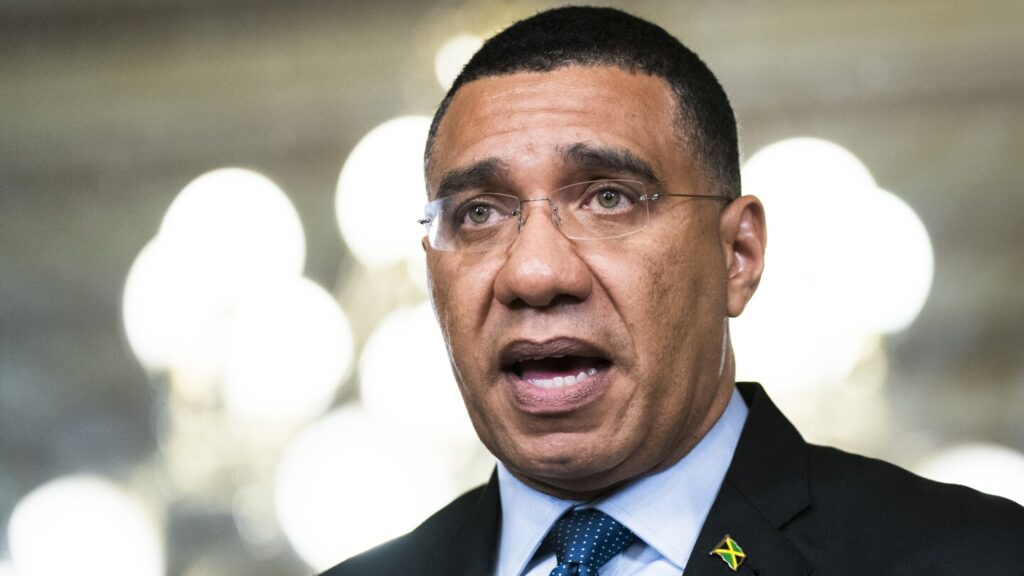KINGSTON, Jamaica (AP) — Jamaica was holding a general election on Wednesday that many believe could be a defining moment for an island shaken by corruption, inequity and economic concerns.
Prime Minister Andrew Holness of the Jamaica Labor Party is seeking a third term and running against Mark Golding, an attorney and longtime leader of the People’s National Party. The Jamaica Progressive Party and the United Independents’ Congress are also in the running.
In addition, nine independent candidates are registered to contest the election in various constituencies.
A total of 63 seats are up for grabs in Jamaica’s House of Representatives. The leader of the party that wins a majority becomes the island’s next prime minister.
The new leader will then appoint 13 of 21 senators to Jamaica’s upper chamber of Parliament, and the opposition will choose eight others.
A challenge to a third term
Under Holness, Jamaica has seen a 43% drop in killings so far this year, marking the most significant decline in decades. The improvement is largely credited to the current administration’s increase in firearm seizures and a stronger, coordinated security force presence across the Caribbean island.
The Jamaica Labor Party is campaigning on this tangible success, positioning itself as the government that pulled the island back from the brink of widespread violence.
While crime statistics have improved, the shadow of Jamaica’s violent past still lingers. The measures taken by the current government, including implementing states of emergency in certain areas, have drawn both support and criticism.
The private sector and many Jamaicans have praised the effectiveness of such measures, with the number of killings dropping by as much as 70% in some regions, like the tourist parish of St. James.
However, human rights organizations have raised concerns about the use and potential abuse of such measures, highlighting alleged illegal detentions, as they call for balanced approaches to protect security and civil liberties.
The Jamaica Labor Party also has emphasized fiscal responsibility, a low unemployment rate and the importance of continuity as it urged voters not to risk reversing the progress achieved so far.
On Sunday, Holness pledged that his party would double the current minimum wage of $100 per 40-hour workweek if reelected.
“We believe in growing the economy so that everyone gets a bigger slice. As the economy expands, we must ensure those at the bottom are rewarded fairly, while creating incentives for more Jamaicans, especially our youth, to join the labor force,” he said at a recent rally.
But his pledge drew criticism from groups representing various business sectors.
“Tourism accounts for approximately one-third of Jamaica’s gross domestic product and is one of the country’s largest employers,” the Jamaica Hotel and Tourist Association said. “Any shifts in wage policy will therefore have wide-ranging implications for the sector, including employment levels, competitiveness and the affordability of the Jamaican tourism product.”
Meanwhile, the People’s National Party, or PNP, adopted a sharper, more critical tone before the election. It has asserted that while progress has been made, many Jamaicans still feel the pinch of socioeconomic challenges, including poverty, inadequate infrastructure and lingering pockets of crime and corruption.
The party has aimed to channel public discontent into a mandate for change, promising reforms, renewed social investments and a break from what it calls “complacency” in governance.
Key among the party’s raft of policy proposals to address the socioeconomic woes of Jamaicans is increasing the income tax threshold to $21,800, up from the current $11,200. The opposition party argues that it would result in working-class Jamaicans taking home more money and provide a cushion from rising prices.
“The People’s National Party is ready to deliver a better life for our people,” Golding said at a rally on Monday. “From fair taxes to better roads, stronger water systems, and respect for our transport operators, the PNP has the plans, the vision and the momentum.”
Fading turnout
In the weeks leading up to Wednesday’s election, the campaign atmosphere was intense and competitive.
Just over 2 million registered voters are eligible to cast their ballots on the island of 2.8 million people, although turnout remains to be seen.
Despite Jamaica’s vibrant democratic tradition, recent years have seen a decline in poll participation. Voter turnout in the 2020 general election was roughly 37%, though the vote was held months after the start of the coronavirus pandemic.
On Aug. 29, members of Jamaica’s security forces and election day workers cast their ballots for this year’s election. The electoral office reported a 57% turnout.

